University Corporate and Business Law Case Study Report
VerifiedAdded on 2022/11/29
|9
|2443
|345
Report
AI Summary
This report provides a comprehensive analysis of two case studies in corporate and business law. Part A examines an agency law issue, assessing the liability of a company for its manager's actions, the company's ability to deny liability, and the manager's potential liability for breaches of duty, including non-competition. It applies relevant legal principles and case law to determine the outcomes. Part B focuses on corporations law, addressing the implications of a company's pre-incorporation contracts and the assumptions that can be made when dealing with a company. It analyzes the validity of contracts entered before company registration, the requirements for ratification, and the liability of the company for damages if the contract is not ratified. The analysis considers the Corporations Act 2001 (Cth) and related case law, focusing on the obligations of the company and the rights of third parties. The report concludes with a detailed discussion of each case, providing legal reasoning and practical implications.
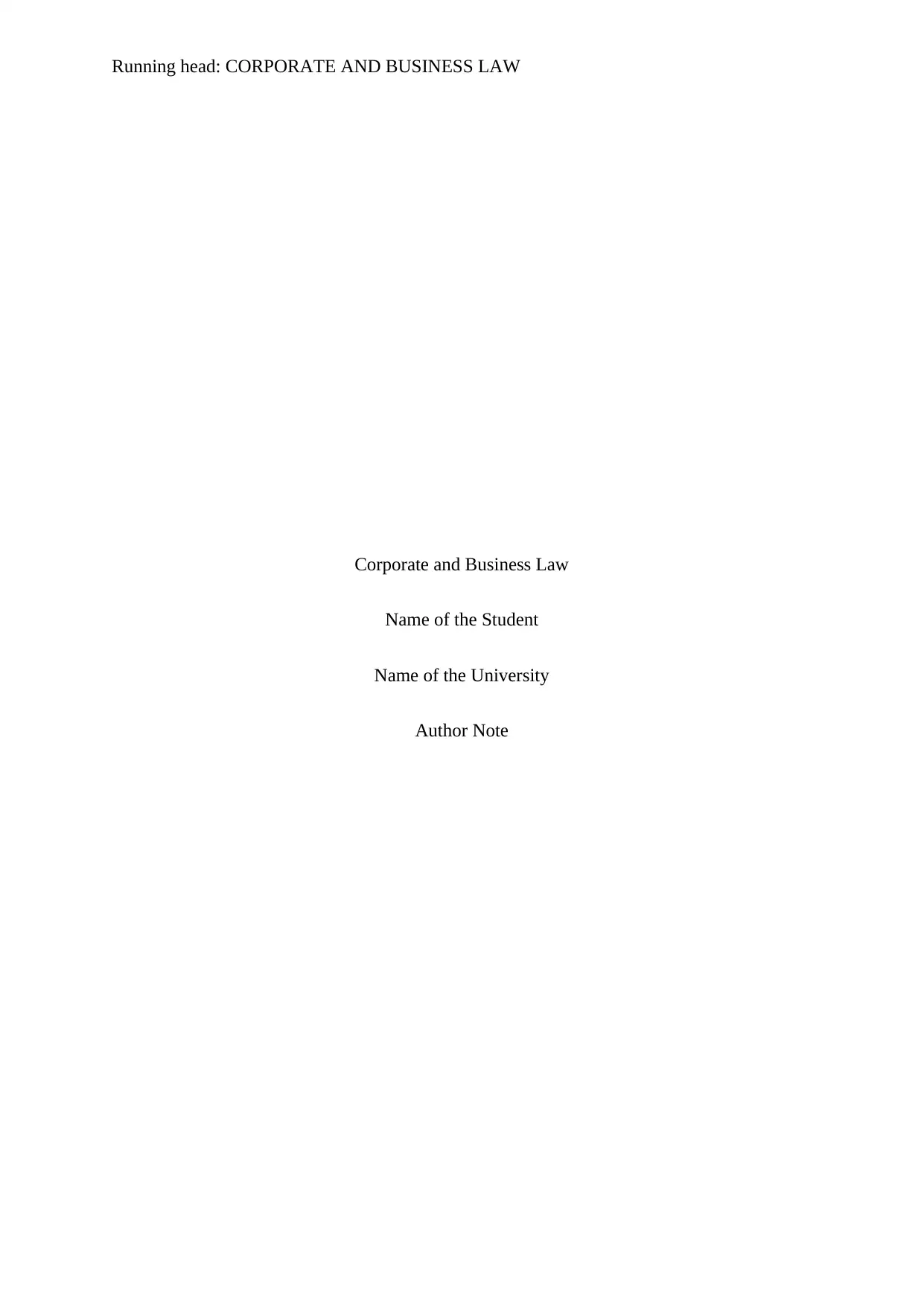
Running head: CORPORATE AND BUSINESS LAW
Corporate and Business Law
Name of the Student
Name of the University
Author Note
Corporate and Business Law
Name of the Student
Name of the University
Author Note
Paraphrase This Document
Need a fresh take? Get an instant paraphrase of this document with our AI Paraphraser
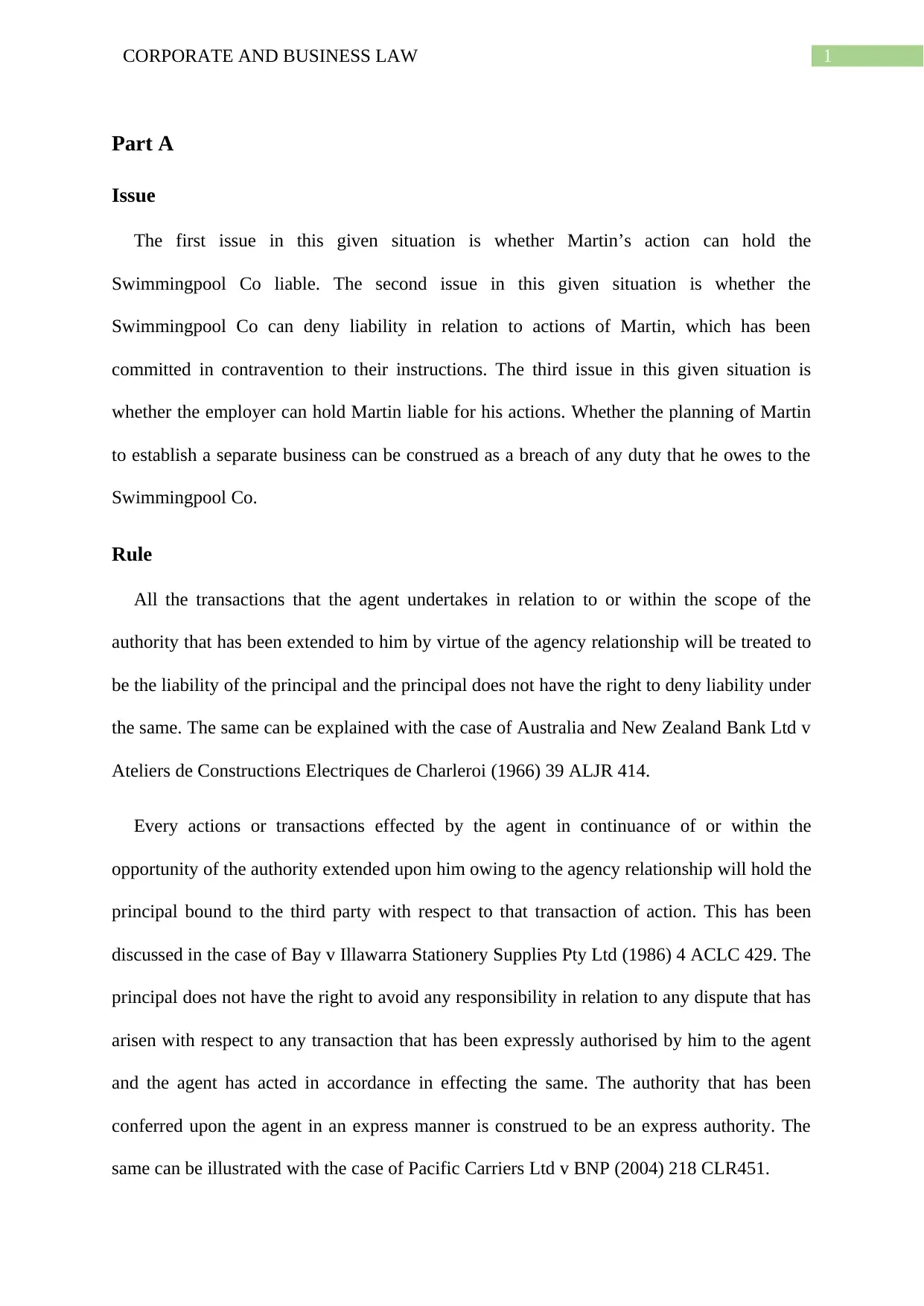
1CORPORATE AND BUSINESS LAW
Part A
Issue
The first issue in this given situation is whether Martin’s action can hold the
Swimmingpool Co liable. The second issue in this given situation is whether the
Swimmingpool Co can deny liability in relation to actions of Martin, which has been
committed in contravention to their instructions. The third issue in this given situation is
whether the employer can hold Martin liable for his actions. Whether the planning of Martin
to establish a separate business can be construed as a breach of any duty that he owes to the
Swimmingpool Co.
Rule
All the transactions that the agent undertakes in relation to or within the scope of the
authority that has been extended to him by virtue of the agency relationship will be treated to
be the liability of the principal and the principal does not have the right to deny liability under
the same. The same can be explained with the case of Australia and New Zealand Bank Ltd v
Ateliers de Constructions Electriques de Charleroi (1966) 39 ALJR 414.
Every actions or transactions effected by the agent in continuance of or within the
opportunity of the authority extended upon him owing to the agency relationship will hold the
principal bound to the third party with respect to that transaction of action. This has been
discussed in the case of Bay v Illawarra Stationery Supplies Pty Ltd (1986) 4 ACLC 429. The
principal does not have the right to avoid any responsibility in relation to any dispute that has
arisen with respect to any transaction that has been expressly authorised by him to the agent
and the agent has acted in accordance in effecting the same. The authority that has been
conferred upon the agent in an express manner is construed to be an express authority. The
same can be illustrated with the case of Pacific Carriers Ltd v BNP (2004) 218 CLR451.
Part A
Issue
The first issue in this given situation is whether Martin’s action can hold the
Swimmingpool Co liable. The second issue in this given situation is whether the
Swimmingpool Co can deny liability in relation to actions of Martin, which has been
committed in contravention to their instructions. The third issue in this given situation is
whether the employer can hold Martin liable for his actions. Whether the planning of Martin
to establish a separate business can be construed as a breach of any duty that he owes to the
Swimmingpool Co.
Rule
All the transactions that the agent undertakes in relation to or within the scope of the
authority that has been extended to him by virtue of the agency relationship will be treated to
be the liability of the principal and the principal does not have the right to deny liability under
the same. The same can be explained with the case of Australia and New Zealand Bank Ltd v
Ateliers de Constructions Electriques de Charleroi (1966) 39 ALJR 414.
Every actions or transactions effected by the agent in continuance of or within the
opportunity of the authority extended upon him owing to the agency relationship will hold the
principal bound to the third party with respect to that transaction of action. This has been
discussed in the case of Bay v Illawarra Stationery Supplies Pty Ltd (1986) 4 ACLC 429. The
principal does not have the right to avoid any responsibility in relation to any dispute that has
arisen with respect to any transaction that has been expressly authorised by him to the agent
and the agent has acted in accordance in effecting the same. The authority that has been
conferred upon the agent in an express manner is construed to be an express authority. The
same can be illustrated with the case of Pacific Carriers Ltd v BNP (2004) 218 CLR451.
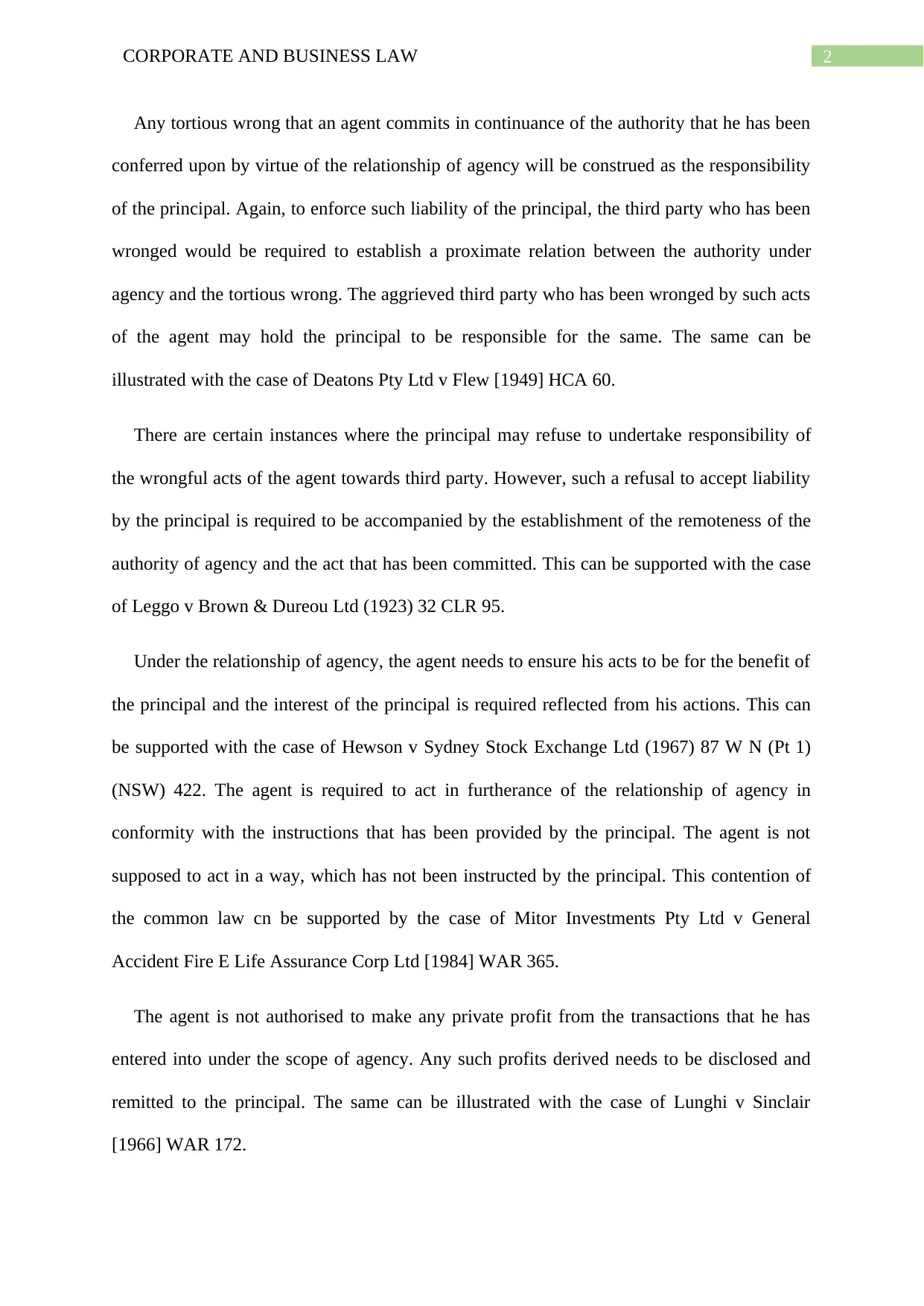
2CORPORATE AND BUSINESS LAW
Any tortious wrong that an agent commits in continuance of the authority that he has been
conferred upon by virtue of the relationship of agency will be construed as the responsibility
of the principal. Again, to enforce such liability of the principal, the third party who has been
wronged would be required to establish a proximate relation between the authority under
agency and the tortious wrong. The aggrieved third party who has been wronged by such acts
of the agent may hold the principal to be responsible for the same. The same can be
illustrated with the case of Deatons Pty Ltd v Flew [1949] HCA 60.
There are certain instances where the principal may refuse to undertake responsibility of
the wrongful acts of the agent towards third party. However, such a refusal to accept liability
by the principal is required to be accompanied by the establishment of the remoteness of the
authority of agency and the act that has been committed. This can be supported with the case
of Leggo v Brown & Dureou Ltd (1923) 32 CLR 95.
Under the relationship of agency, the agent needs to ensure his acts to be for the benefit of
the principal and the interest of the principal is required reflected from his actions. This can
be supported with the case of Hewson v Sydney Stock Exchange Ltd (1967) 87 W N (Pt 1)
(NSW) 422. The agent is required to act in furtherance of the relationship of agency in
conformity with the instructions that has been provided by the principal. The agent is not
supposed to act in a way, which has not been instructed by the principal. This contention of
the common law cn be supported by the case of Mitor Investments Pty Ltd v General
Accident Fire E Life Assurance Corp Ltd [1984] WAR 365.
The agent is not authorised to make any private profit from the transactions that he has
entered into under the scope of agency. Any such profits derived needs to be disclosed and
remitted to the principal. The same can be illustrated with the case of Lunghi v Sinclair
[1966] WAR 172.
Any tortious wrong that an agent commits in continuance of the authority that he has been
conferred upon by virtue of the relationship of agency will be construed as the responsibility
of the principal. Again, to enforce such liability of the principal, the third party who has been
wronged would be required to establish a proximate relation between the authority under
agency and the tortious wrong. The aggrieved third party who has been wronged by such acts
of the agent may hold the principal to be responsible for the same. The same can be
illustrated with the case of Deatons Pty Ltd v Flew [1949] HCA 60.
There are certain instances where the principal may refuse to undertake responsibility of
the wrongful acts of the agent towards third party. However, such a refusal to accept liability
by the principal is required to be accompanied by the establishment of the remoteness of the
authority of agency and the act that has been committed. This can be supported with the case
of Leggo v Brown & Dureou Ltd (1923) 32 CLR 95.
Under the relationship of agency, the agent needs to ensure his acts to be for the benefit of
the principal and the interest of the principal is required reflected from his actions. This can
be supported with the case of Hewson v Sydney Stock Exchange Ltd (1967) 87 W N (Pt 1)
(NSW) 422. The agent is required to act in furtherance of the relationship of agency in
conformity with the instructions that has been provided by the principal. The agent is not
supposed to act in a way, which has not been instructed by the principal. This contention of
the common law cn be supported by the case of Mitor Investments Pty Ltd v General
Accident Fire E Life Assurance Corp Ltd [1984] WAR 365.
The agent is not authorised to make any private profit from the transactions that he has
entered into under the scope of agency. Any such profits derived needs to be disclosed and
remitted to the principal. The same can be illustrated with the case of Lunghi v Sinclair
[1966] WAR 172.
⊘ This is a preview!⊘
Do you want full access?
Subscribe today to unlock all pages.

Trusted by 1+ million students worldwide
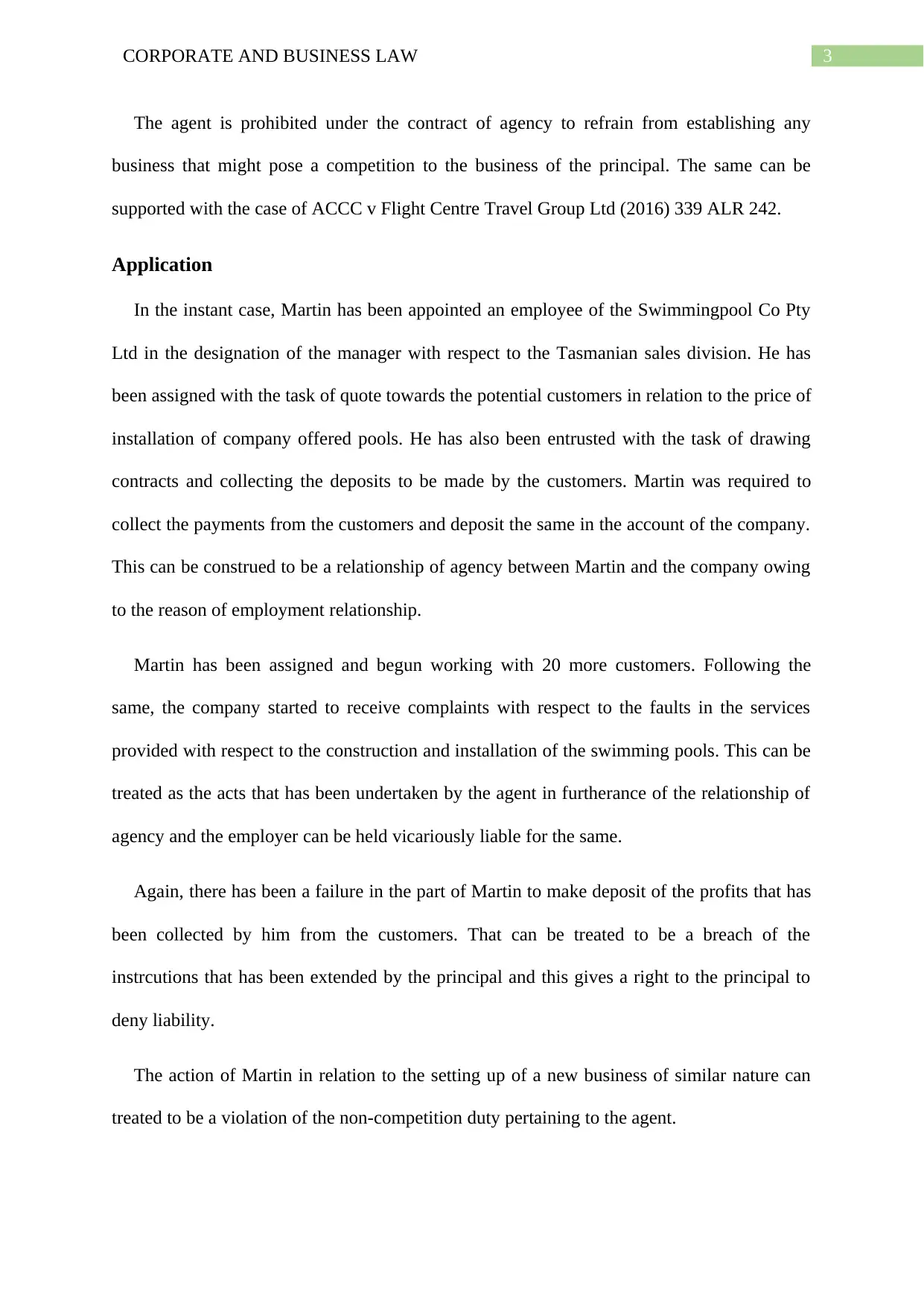
3CORPORATE AND BUSINESS LAW
The agent is prohibited under the contract of agency to refrain from establishing any
business that might pose a competition to the business of the principal. The same can be
supported with the case of ACCC v Flight Centre Travel Group Ltd (2016) 339 ALR 242.
Application
In the instant case, Martin has been appointed an employee of the Swimmingpool Co Pty
Ltd in the designation of the manager with respect to the Tasmanian sales division. He has
been assigned with the task of quote towards the potential customers in relation to the price of
installation of company offered pools. He has also been entrusted with the task of drawing
contracts and collecting the deposits to be made by the customers. Martin was required to
collect the payments from the customers and deposit the same in the account of the company.
This can be construed to be a relationship of agency between Martin and the company owing
to the reason of employment relationship.
Martin has been assigned and begun working with 20 more customers. Following the
same, the company started to receive complaints with respect to the faults in the services
provided with respect to the construction and installation of the swimming pools. This can be
treated as the acts that has been undertaken by the agent in furtherance of the relationship of
agency and the employer can be held vicariously liable for the same.
Again, there has been a failure in the part of Martin to make deposit of the profits that has
been collected by him from the customers. That can be treated to be a breach of the
instrcutions that has been extended by the principal and this gives a right to the principal to
deny liability.
The action of Martin in relation to the setting up of a new business of similar nature can
treated to be a violation of the non-competition duty pertaining to the agent.
The agent is prohibited under the contract of agency to refrain from establishing any
business that might pose a competition to the business of the principal. The same can be
supported with the case of ACCC v Flight Centre Travel Group Ltd (2016) 339 ALR 242.
Application
In the instant case, Martin has been appointed an employee of the Swimmingpool Co Pty
Ltd in the designation of the manager with respect to the Tasmanian sales division. He has
been assigned with the task of quote towards the potential customers in relation to the price of
installation of company offered pools. He has also been entrusted with the task of drawing
contracts and collecting the deposits to be made by the customers. Martin was required to
collect the payments from the customers and deposit the same in the account of the company.
This can be construed to be a relationship of agency between Martin and the company owing
to the reason of employment relationship.
Martin has been assigned and begun working with 20 more customers. Following the
same, the company started to receive complaints with respect to the faults in the services
provided with respect to the construction and installation of the swimming pools. This can be
treated as the acts that has been undertaken by the agent in furtherance of the relationship of
agency and the employer can be held vicariously liable for the same.
Again, there has been a failure in the part of Martin to make deposit of the profits that has
been collected by him from the customers. That can be treated to be a breach of the
instrcutions that has been extended by the principal and this gives a right to the principal to
deny liability.
The action of Martin in relation to the setting up of a new business of similar nature can
treated to be a violation of the non-competition duty pertaining to the agent.
Paraphrase This Document
Need a fresh take? Get an instant paraphrase of this document with our AI Paraphraser
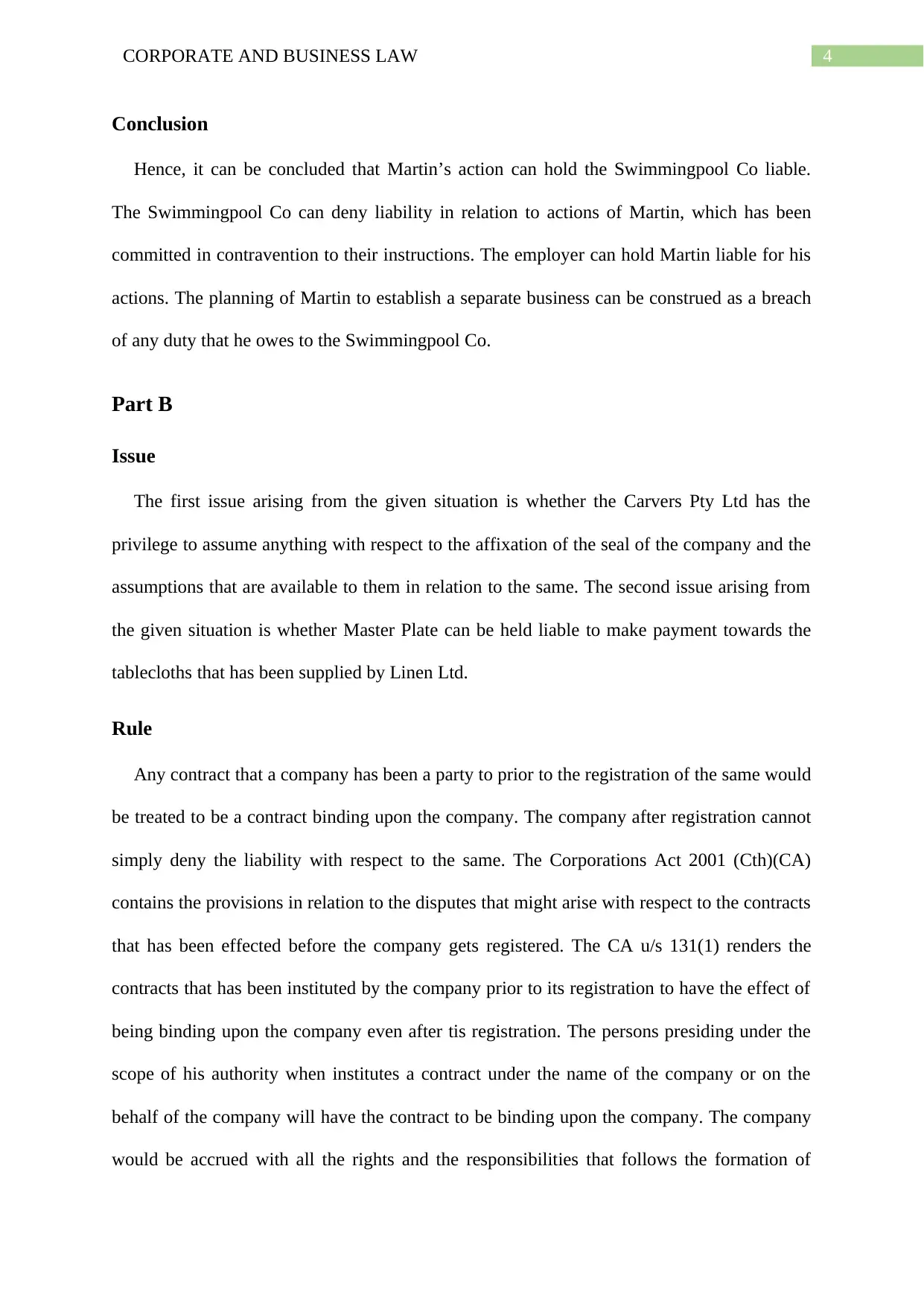
4CORPORATE AND BUSINESS LAW
Conclusion
Hence, it can be concluded that Martin’s action can hold the Swimmingpool Co liable.
The Swimmingpool Co can deny liability in relation to actions of Martin, which has been
committed in contravention to their instructions. The employer can hold Martin liable for his
actions. The planning of Martin to establish a separate business can be construed as a breach
of any duty that he owes to the Swimmingpool Co.
Part B
Issue
The first issue arising from the given situation is whether the Carvers Pty Ltd has the
privilege to assume anything with respect to the affixation of the seal of the company and the
assumptions that are available to them in relation to the same. The second issue arising from
the given situation is whether Master Plate can be held liable to make payment towards the
tablecloths that has been supplied by Linen Ltd.
Rule
Any contract that a company has been a party to prior to the registration of the same would
be treated to be a contract binding upon the company. The company after registration cannot
simply deny the liability with respect to the same. The Corporations Act 2001 (Cth)(CA)
contains the provisions in relation to the disputes that might arise with respect to the contracts
that has been effected before the company gets registered. The CA u/s 131(1) renders the
contracts that has been instituted by the company prior to its registration to have the effect of
being binding upon the company even after tis registration. The persons presiding under the
scope of his authority when institutes a contract under the name of the company or on the
behalf of the company will have the contract to be binding upon the company. The company
would be accrued with all the rights and the responsibilities that follows the formation of
Conclusion
Hence, it can be concluded that Martin’s action can hold the Swimmingpool Co liable.
The Swimmingpool Co can deny liability in relation to actions of Martin, which has been
committed in contravention to their instructions. The employer can hold Martin liable for his
actions. The planning of Martin to establish a separate business can be construed as a breach
of any duty that he owes to the Swimmingpool Co.
Part B
Issue
The first issue arising from the given situation is whether the Carvers Pty Ltd has the
privilege to assume anything with respect to the affixation of the seal of the company and the
assumptions that are available to them in relation to the same. The second issue arising from
the given situation is whether Master Plate can be held liable to make payment towards the
tablecloths that has been supplied by Linen Ltd.
Rule
Any contract that a company has been a party to prior to the registration of the same would
be treated to be a contract binding upon the company. The company after registration cannot
simply deny the liability with respect to the same. The Corporations Act 2001 (Cth)(CA)
contains the provisions in relation to the disputes that might arise with respect to the contracts
that has been effected before the company gets registered. The CA u/s 131(1) renders the
contracts that has been instituted by the company prior to its registration to have the effect of
being binding upon the company even after tis registration. The persons presiding under the
scope of his authority when institutes a contract under the name of the company or on the
behalf of the company will have the contract to be binding upon the company. The company
would be accrued with all the rights and the responsibilities that follows the formation of
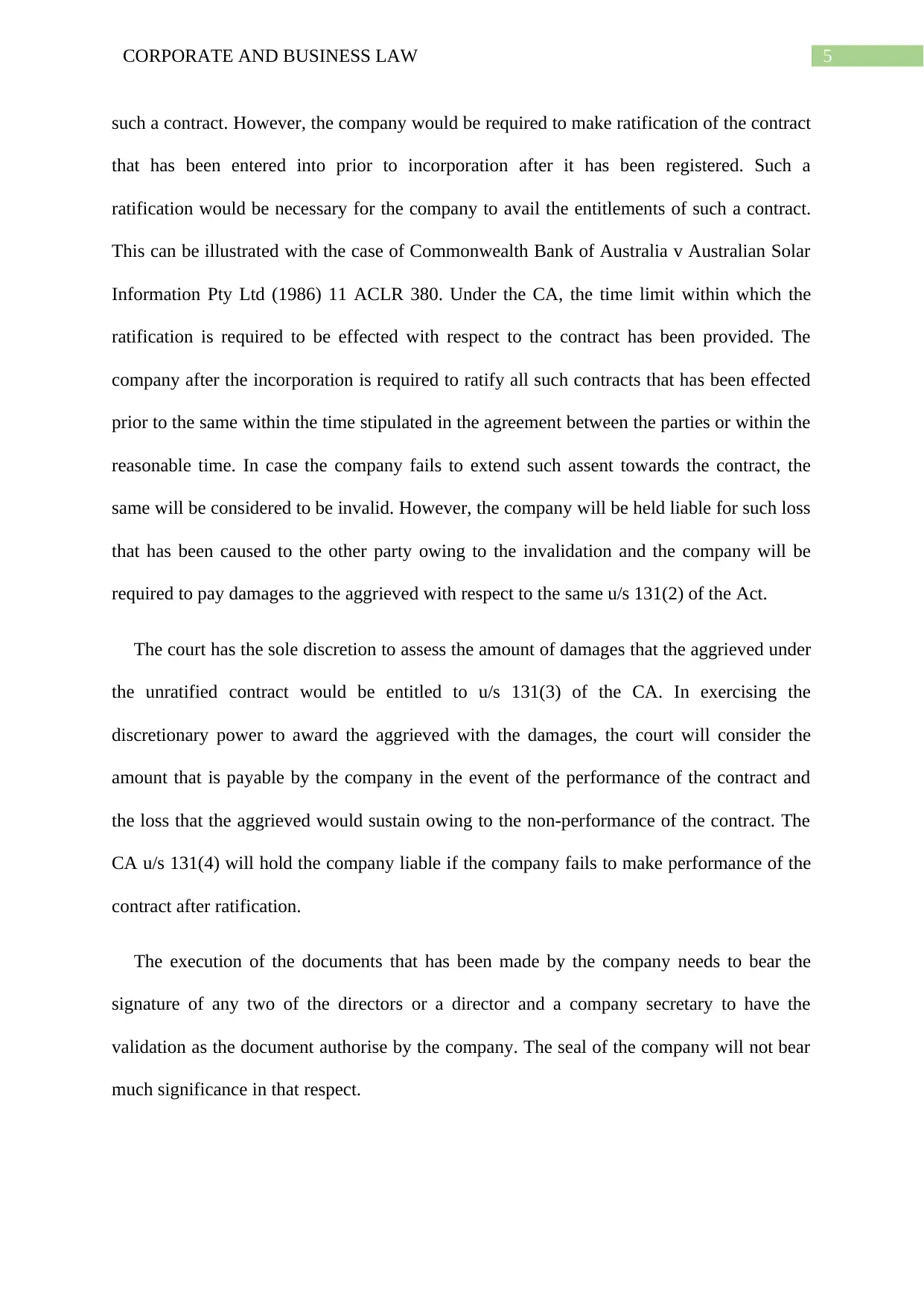
5CORPORATE AND BUSINESS LAW
such a contract. However, the company would be required to make ratification of the contract
that has been entered into prior to incorporation after it has been registered. Such a
ratification would be necessary for the company to avail the entitlements of such a contract.
This can be illustrated with the case of Commonwealth Bank of Australia v Australian Solar
Information Pty Ltd (1986) 11 ACLR 380. Under the CA, the time limit within which the
ratification is required to be effected with respect to the contract has been provided. The
company after the incorporation is required to ratify all such contracts that has been effected
prior to the same within the time stipulated in the agreement between the parties or within the
reasonable time. In case the company fails to extend such assent towards the contract, the
same will be considered to be invalid. However, the company will be held liable for such loss
that has been caused to the other party owing to the invalidation and the company will be
required to pay damages to the aggrieved with respect to the same u/s 131(2) of the Act.
The court has the sole discretion to assess the amount of damages that the aggrieved under
the unratified contract would be entitled to u/s 131(3) of the CA. In exercising the
discretionary power to award the aggrieved with the damages, the court will consider the
amount that is payable by the company in the event of the performance of the contract and
the loss that the aggrieved would sustain owing to the non-performance of the contract. The
CA u/s 131(4) will hold the company liable if the company fails to make performance of the
contract after ratification.
The execution of the documents that has been made by the company needs to bear the
signature of any two of the directors or a director and a company secretary to have the
validation as the document authorise by the company. The seal of the company will not bear
much significance in that respect.
such a contract. However, the company would be required to make ratification of the contract
that has been entered into prior to incorporation after it has been registered. Such a
ratification would be necessary for the company to avail the entitlements of such a contract.
This can be illustrated with the case of Commonwealth Bank of Australia v Australian Solar
Information Pty Ltd (1986) 11 ACLR 380. Under the CA, the time limit within which the
ratification is required to be effected with respect to the contract has been provided. The
company after the incorporation is required to ratify all such contracts that has been effected
prior to the same within the time stipulated in the agreement between the parties or within the
reasonable time. In case the company fails to extend such assent towards the contract, the
same will be considered to be invalid. However, the company will be held liable for such loss
that has been caused to the other party owing to the invalidation and the company will be
required to pay damages to the aggrieved with respect to the same u/s 131(2) of the Act.
The court has the sole discretion to assess the amount of damages that the aggrieved under
the unratified contract would be entitled to u/s 131(3) of the CA. In exercising the
discretionary power to award the aggrieved with the damages, the court will consider the
amount that is payable by the company in the event of the performance of the contract and
the loss that the aggrieved would sustain owing to the non-performance of the contract. The
CA u/s 131(4) will hold the company liable if the company fails to make performance of the
contract after ratification.
The execution of the documents that has been made by the company needs to bear the
signature of any two of the directors or a director and a company secretary to have the
validation as the document authorise by the company. The seal of the company will not bear
much significance in that respect.
⊘ This is a preview!⊘
Do you want full access?
Subscribe today to unlock all pages.

Trusted by 1+ million students worldwide
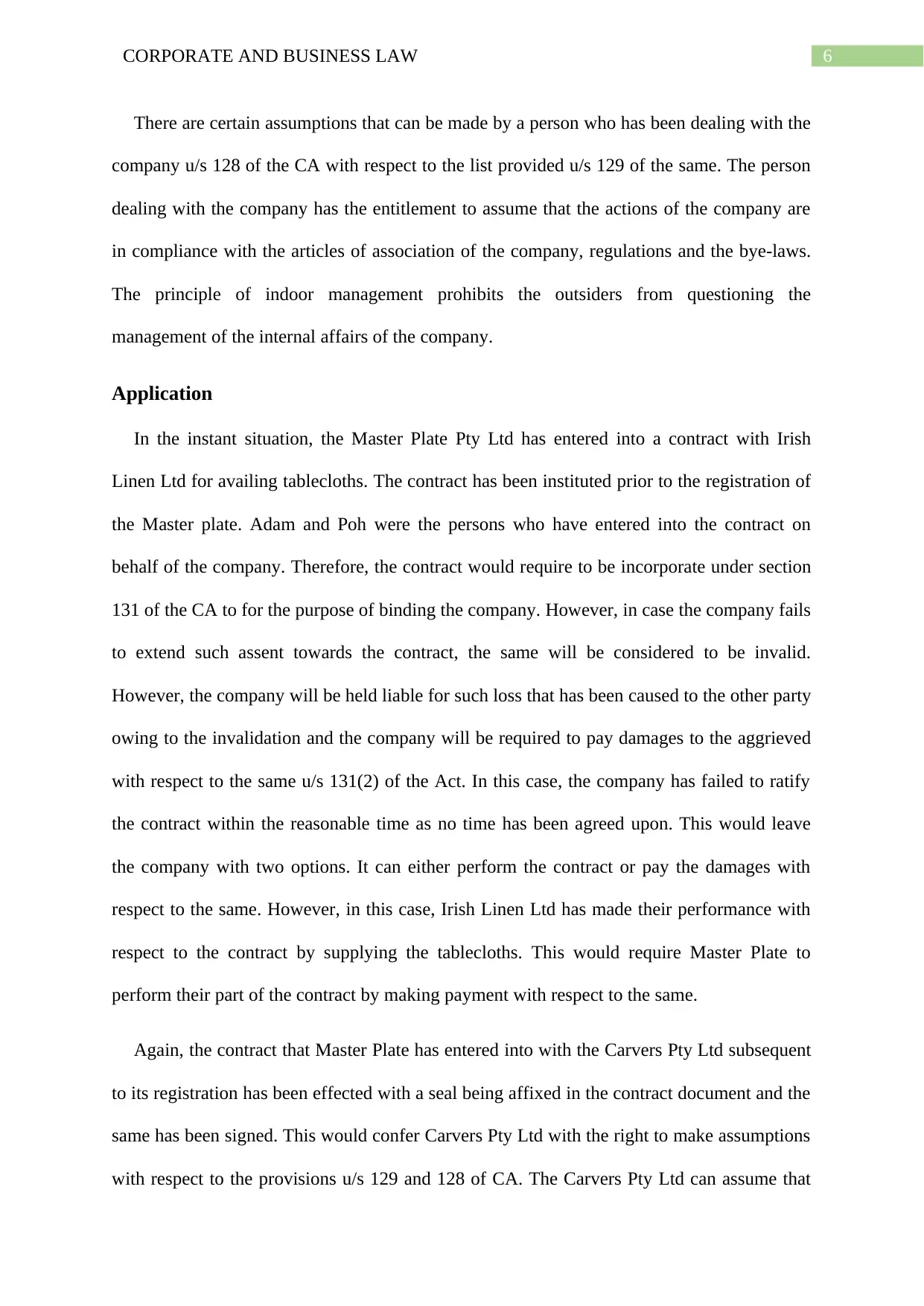
6CORPORATE AND BUSINESS LAW
There are certain assumptions that can be made by a person who has been dealing with the
company u/s 128 of the CA with respect to the list provided u/s 129 of the same. The person
dealing with the company has the entitlement to assume that the actions of the company are
in compliance with the articles of association of the company, regulations and the bye-laws.
The principle of indoor management prohibits the outsiders from questioning the
management of the internal affairs of the company.
Application
In the instant situation, the Master Plate Pty Ltd has entered into a contract with Irish
Linen Ltd for availing tablecloths. The contract has been instituted prior to the registration of
the Master plate. Adam and Poh were the persons who have entered into the contract on
behalf of the company. Therefore, the contract would require to be incorporate under section
131 of the CA to for the purpose of binding the company. However, in case the company fails
to extend such assent towards the contract, the same will be considered to be invalid.
However, the company will be held liable for such loss that has been caused to the other party
owing to the invalidation and the company will be required to pay damages to the aggrieved
with respect to the same u/s 131(2) of the Act. In this case, the company has failed to ratify
the contract within the reasonable time as no time has been agreed upon. This would leave
the company with two options. It can either perform the contract or pay the damages with
respect to the same. However, in this case, Irish Linen Ltd has made their performance with
respect to the contract by supplying the tablecloths. This would require Master Plate to
perform their part of the contract by making payment with respect to the same.
Again, the contract that Master Plate has entered into with the Carvers Pty Ltd subsequent
to its registration has been effected with a seal being affixed in the contract document and the
same has been signed. This would confer Carvers Pty Ltd with the right to make assumptions
with respect to the provisions u/s 129 and 128 of CA. The Carvers Pty Ltd can assume that
There are certain assumptions that can be made by a person who has been dealing with the
company u/s 128 of the CA with respect to the list provided u/s 129 of the same. The person
dealing with the company has the entitlement to assume that the actions of the company are
in compliance with the articles of association of the company, regulations and the bye-laws.
The principle of indoor management prohibits the outsiders from questioning the
management of the internal affairs of the company.
Application
In the instant situation, the Master Plate Pty Ltd has entered into a contract with Irish
Linen Ltd for availing tablecloths. The contract has been instituted prior to the registration of
the Master plate. Adam and Poh were the persons who have entered into the contract on
behalf of the company. Therefore, the contract would require to be incorporate under section
131 of the CA to for the purpose of binding the company. However, in case the company fails
to extend such assent towards the contract, the same will be considered to be invalid.
However, the company will be held liable for such loss that has been caused to the other party
owing to the invalidation and the company will be required to pay damages to the aggrieved
with respect to the same u/s 131(2) of the Act. In this case, the company has failed to ratify
the contract within the reasonable time as no time has been agreed upon. This would leave
the company with two options. It can either perform the contract or pay the damages with
respect to the same. However, in this case, Irish Linen Ltd has made their performance with
respect to the contract by supplying the tablecloths. This would require Master Plate to
perform their part of the contract by making payment with respect to the same.
Again, the contract that Master Plate has entered into with the Carvers Pty Ltd subsequent
to its registration has been effected with a seal being affixed in the contract document and the
same has been signed. This would confer Carvers Pty Ltd with the right to make assumptions
with respect to the provisions u/s 129 and 128 of CA. The Carvers Pty Ltd can assume that
Paraphrase This Document
Need a fresh take? Get an instant paraphrase of this document with our AI Paraphraser
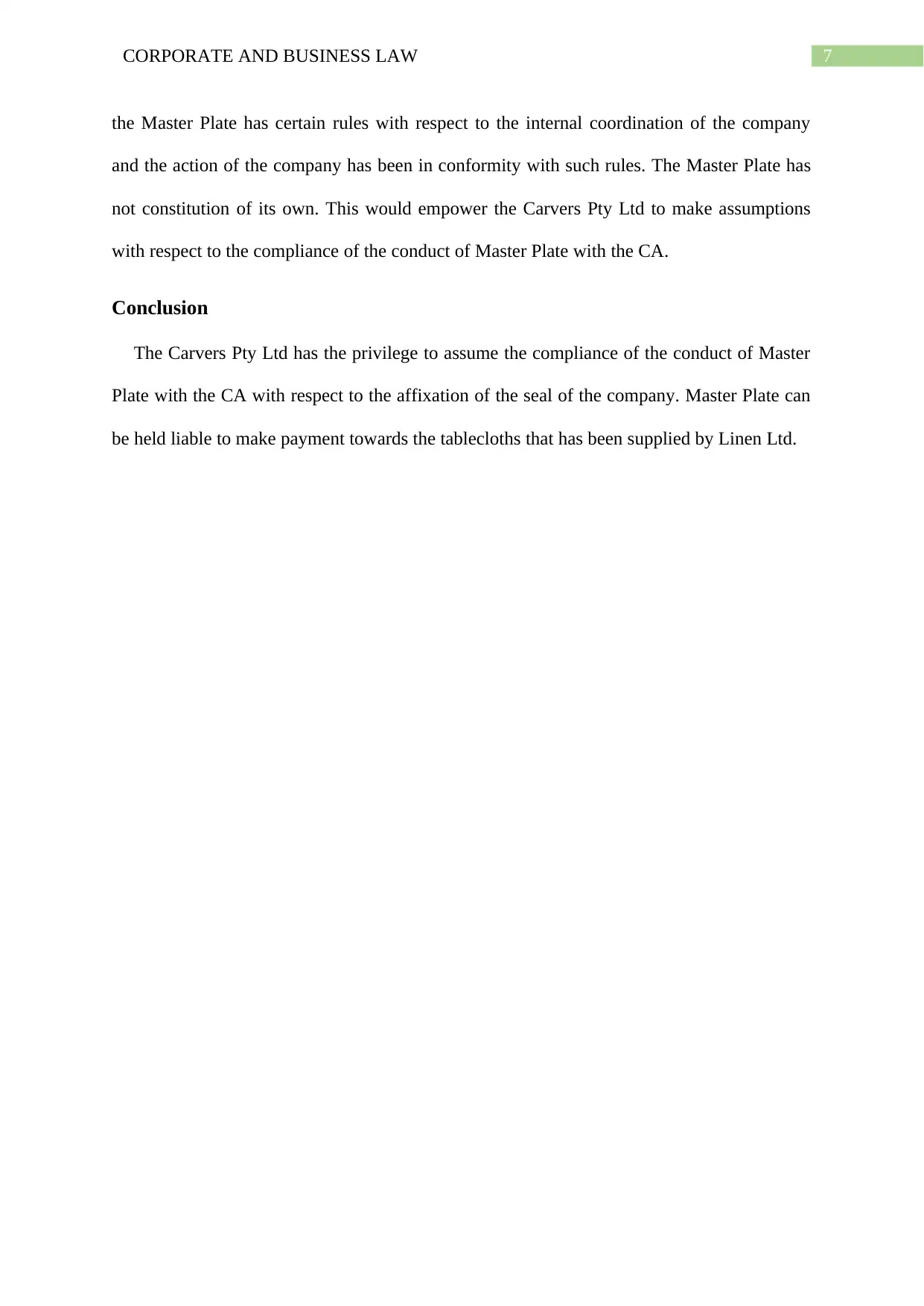
7CORPORATE AND BUSINESS LAW
the Master Plate has certain rules with respect to the internal coordination of the company
and the action of the company has been in conformity with such rules. The Master Plate has
not constitution of its own. This would empower the Carvers Pty Ltd to make assumptions
with respect to the compliance of the conduct of Master Plate with the CA.
Conclusion
The Carvers Pty Ltd has the privilege to assume the compliance of the conduct of Master
Plate with the CA with respect to the affixation of the seal of the company. Master Plate can
be held liable to make payment towards the tablecloths that has been supplied by Linen Ltd.
the Master Plate has certain rules with respect to the internal coordination of the company
and the action of the company has been in conformity with such rules. The Master Plate has
not constitution of its own. This would empower the Carvers Pty Ltd to make assumptions
with respect to the compliance of the conduct of Master Plate with the CA.
Conclusion
The Carvers Pty Ltd has the privilege to assume the compliance of the conduct of Master
Plate with the CA with respect to the affixation of the seal of the company. Master Plate can
be held liable to make payment towards the tablecloths that has been supplied by Linen Ltd.
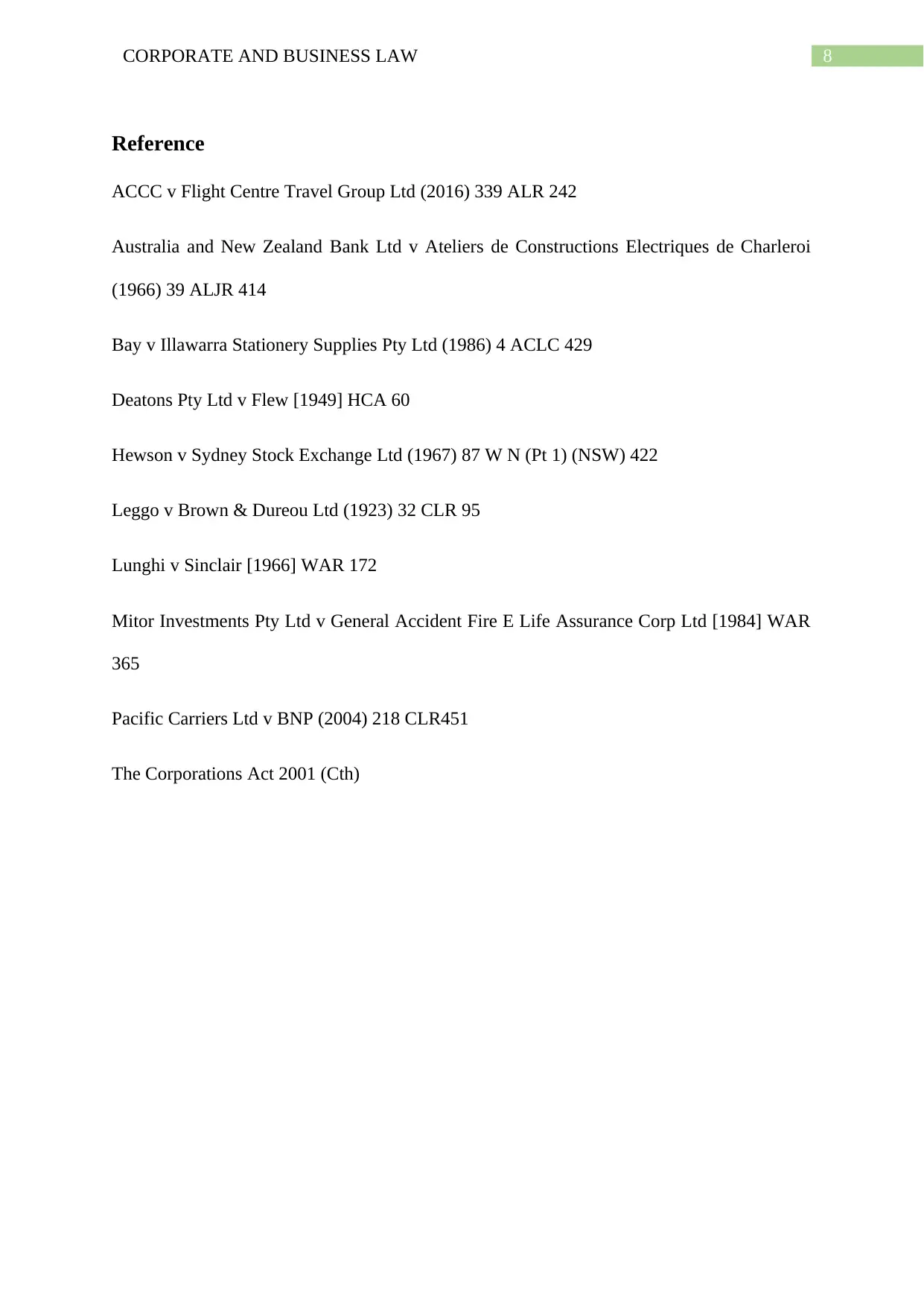
8CORPORATE AND BUSINESS LAW
Reference
ACCC v Flight Centre Travel Group Ltd (2016) 339 ALR 242
Australia and New Zealand Bank Ltd v Ateliers de Constructions Electriques de Charleroi
(1966) 39 ALJR 414
Bay v Illawarra Stationery Supplies Pty Ltd (1986) 4 ACLC 429
Deatons Pty Ltd v Flew [1949] HCA 60
Hewson v Sydney Stock Exchange Ltd (1967) 87 W N (Pt 1) (NSW) 422
Leggo v Brown & Dureou Ltd (1923) 32 CLR 95
Lunghi v Sinclair [1966] WAR 172
Mitor Investments Pty Ltd v General Accident Fire E Life Assurance Corp Ltd [1984] WAR
365
Pacific Carriers Ltd v BNP (2004) 218 CLR451
The Corporations Act 2001 (Cth)
Reference
ACCC v Flight Centre Travel Group Ltd (2016) 339 ALR 242
Australia and New Zealand Bank Ltd v Ateliers de Constructions Electriques de Charleroi
(1966) 39 ALJR 414
Bay v Illawarra Stationery Supplies Pty Ltd (1986) 4 ACLC 429
Deatons Pty Ltd v Flew [1949] HCA 60
Hewson v Sydney Stock Exchange Ltd (1967) 87 W N (Pt 1) (NSW) 422
Leggo v Brown & Dureou Ltd (1923) 32 CLR 95
Lunghi v Sinclair [1966] WAR 172
Mitor Investments Pty Ltd v General Accident Fire E Life Assurance Corp Ltd [1984] WAR
365
Pacific Carriers Ltd v BNP (2004) 218 CLR451
The Corporations Act 2001 (Cth)
⊘ This is a preview!⊘
Do you want full access?
Subscribe today to unlock all pages.

Trusted by 1+ million students worldwide
1 out of 9
Related Documents
Your All-in-One AI-Powered Toolkit for Academic Success.
+13062052269
info@desklib.com
Available 24*7 on WhatsApp / Email
![[object Object]](/_next/static/media/star-bottom.7253800d.svg)
Unlock your academic potential
Copyright © 2020–2026 A2Z Services. All Rights Reserved. Developed and managed by ZUCOL.





